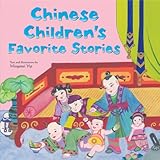Lesson 3: Determining Theme Based on Events in the Story
Lesson Plan
Chinese Children's Favorite Stories

- Learning Goal
- Determine the theme based on the events of a story.
- Duration
- Approximately 50 minutes
- Necessary Materials
- Provided: Direct Teaching for Lesson 3: Example Chart, Guided Practice for Lesson 3: Example Chart, Independent Practice Worksheet
Not Provided: Chinese Children’s Favorite Stories by Mingmei Yip, chart paper, markers
-
Teacher Modeling

will explain that we can use the main events of stories to identify the theme of the story. I will read aloud “The Fish-Basket Goddess” (p. 9) from Chinese Children’s Favorite Stories by Mingmei Yip and chart the main events of the story. (Direct Teaching Teacher Example Chart is provided below in Teacher and Student Materials.) I will determine the theme by thinking about all the events in the story. I will identify the theme as: “Goodness wins over evil.” The Dragon King was evil and when the Goddess came up with a plan to help the people, the Dragon King lost all his powers. I think the author is trying to give the reader the message that being good and clever is better than being mean and bad.
-
Think Check
Ask: How did I identify the theme of the story? Students should answer that as you read, you charted the main events from the story. Then you used these events to draw a conclusion about the message of the story.
-
Guided Practice

will read “The Mouse Bride” (p. 15) from Chinese Children’s Favorite Stories by Mingmei Yip aloud and chart the main events of the story. (See Guided Practice Teacher Example Chart, provided below.) We will use these events to identify the theme of the story: “The strongest and bravest is not always who you think.”
-
Independent Practice

will read “How the Fox Tricked the Tiger” (p.76) from Chinese Children’s Favorite Stories by Mingmei Yip. You will use the main events of the story to determine the theme of the story. (Student Independent Practice is provided below.) Note: You will need to provide your students with the stories for Independent Practice.
Texts & Materials
Standards Alignment
(To see all of the ReadWorks lessons aligned to your standards, click here.)




These are great for small or whole groups.
Great Lesson!!